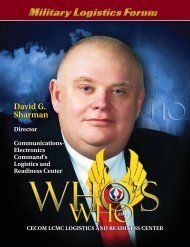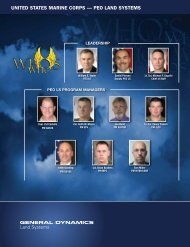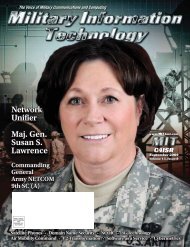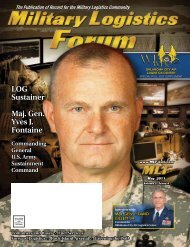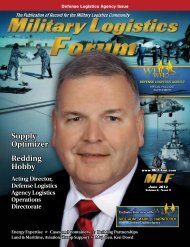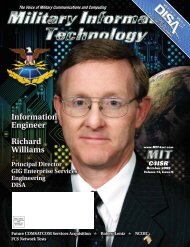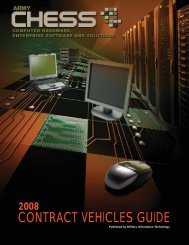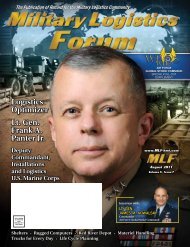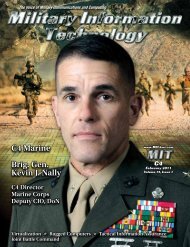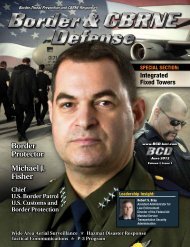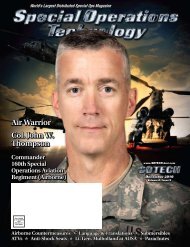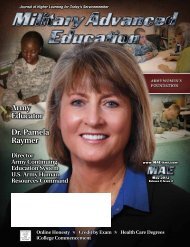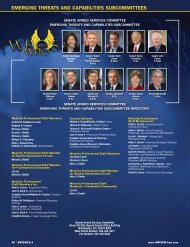Theater Logistician Maj. Gen. Kenneth S. Dowd - KMI Media Group
Theater Logistician Maj. Gen. Kenneth S. Dowd - KMI Media Group
Theater Logistician Maj. Gen. Kenneth S. Dowd - KMI Media Group
You also want an ePaper? Increase the reach of your titles
YUMPU automatically turns print PDFs into web optimized ePapers that Google loves.
So the big thing it adds is a vetting and oversight process<br />
and a process that improves the overall contracting support to<br />
the theater.<br />
Q: Can you describe how the logistics chain is able to drive jobs<br />
and revenue to Iraqi and Afghan firms, thus providing local<br />
jobs? Is this the purpose of the Afghan First Initiative?<br />
A: Exactly. We have the Iraqi First Initiative and the Afghan<br />
First Initiative, and we’re in the crawl stages of a Central Asian<br />
States First Initiative. An example of one of these initiatives is<br />
the Iraqi Trucking Network. We got with local Iraqi tribes to<br />
transport supplies. This allowed us to take U.S. military trucks<br />
off the road. These local Iraqi firms were able to acquire trucks<br />
and hire drivers and do the hauling for us. The Iraqi Trucking<br />
Network concept is starting to spread throughout Iraq, and<br />
eventually it could be an enabler as we start to drawdown to<br />
help us push gear and equipment out of Iraq. The vast majority<br />
of transportation in Afghanistan is already conducted by<br />
Afghan nationals, so<br />
the Afghan First Initiative focuses mainly on procuring<br />
commodities, such as water, soda, juices, building water<br />
plants, and using some of their natural resources in country<br />
in order to help build the infrastructure that we are building<br />
for our military. The NDN is providing an opportunity for our<br />
CASA first initiative to get under way.<br />
Q: How efficient is the current in-theater asset tracking<br />
system in keeping up with materiel movements?<br />
A: I would say in Iraq we are in very good shape. We have a<br />
lot of good [in-transit visibility] ITV. We have some great locations<br />
where we track movements, mainly at the primary border<br />
crossings.<br />
In Afghanistan, the ITV has improved over the last 12<br />
months. I think we now have 16 different locations out along<br />
the Ring Road that give use to a lot more ITV. Considering<br />
CENTCOM’s austere and dangerous environment, we are<br />
pleased with the efficiency the systems provide. Our commercial<br />
vendors such as APL and Maersk are putting ITV and<br />
tracking mechanisms on their platforms so that, as they are<br />
moving supplies over the Pak GLOC, [we] see those supplies<br />
coming up the Pak GLOC and across the border, which allows<br />
the receiving teams to prepare for their arrival.<br />
A lot of good work [by] our Strategic Deployment Distribution<br />
Command partners, who work with the commercial<br />
vendors, helping to move our cargo.<br />
Q: There have been calls recently, from the secretary of<br />
defense and others, to move away from outside contractors.<br />
Has that begun to manifest itself in theater yet? What are<br />
some of the areas that could more easily migrate from outside<br />
contractors back to the military and others that are perhaps<br />
well-suited to remain in the contractor world?<br />
A: I have not really seen any impact in the theater yet. We are<br />
currently reviewing those support pieces. Perhaps the trucking<br />
network would be one possible initiative that, as it grows<br />
to provide more trucking assets from the Iraqi firms to move<br />
24 | MLF 3.7<br />
our materiel around, would do well to remain in the contract<br />
world.<br />
We are still assessing and looking at our contractors. We<br />
need to look at what this will all mean during the drawdown<br />
and how we can reduce the contractor footprint and cut costs.<br />
Bottom line is that a lot of that planning is going on right<br />
now.<br />
Q: The wars in Iraq and Afghanistan have generated a sprintlike<br />
pace to the OPTEMPO that has been eating up life cycle<br />
time on equipment across the board. The truck fleet and<br />
air transport fleets are particularly hard-used. How do you<br />
manage the need to move supplies with fleet of equipment<br />
that is being hard-pressed?<br />
A: There are a couple of primary things we do. As you know,<br />
we have some repair facilities in theater that do rebuild of<br />
the gear forward. So, for instance, the uparmored HMMWVs,<br />
among others, are repaired in theater and not brought back to<br />
CONUS, which helps us a great deal.<br />
We also look at equipment called TPE—theater provided<br />
equipment—which is always kept forward and not brought<br />
back and forth as units rotate in and out. This allows us to<br />
work this set fairly hard since all of the maintenance is done<br />
forward. This gives us the opportunity to get the other equipment<br />
items that need more attention back to CONUS to go<br />
through reset and be ready for the next effort.<br />
So, we have rebuild facilities forward, including some<br />
pushed forward into Iraq; we have the TPE sets; and we have<br />
some tremendous reset capabilities ongoing in CONUS for all<br />
the services.<br />
Q: Anything else you would like to add?<br />
A: I want to thank you for taking the time to interview the<br />
logistician here. A lot of times we are the guys in the back, but<br />
in these kinds of fights we are right up there [at the] front with<br />
the warfighter—there are a tremendous number of logisticians<br />
pushed forward making it happen.<br />
This has been a joint fight. I can tell you that the logisticians<br />
from all the services have blended together well, and we<br />
have some incredibly creative thinking going on about how to<br />
do air movements, airdrops, how to move MRAPs and anything<br />
else the warfighter needs so that the end-users have what they<br />
need when they need it.<br />
My main point is that I am very proud of what the logisticians<br />
are doing in theater, and we have had a really great team<br />
onboard that has done some great planning with the national<br />
partners to make sure they are involved in our efforts. We have<br />
been right there toe-to-toe with the warfighters making sure<br />
that the logistician’s requirements and needs are heard and<br />
[that we] eliminate duplication of effort where possible.<br />
This has been a great effort that has brought people<br />
together to develop the plans, develop the conops and make<br />
sure that the logistics of the plan are supportable.<br />
It is amazing what we are doing in theater with the great<br />
help of our national partners; TRANSCOM, DLA, Army Materiel<br />
Command, Marine Corps Materiel Command and all the others<br />
that help us every day. ✯<br />
www.MLF-kmi.com




